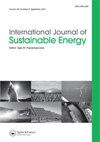Wicked facets of the German energy transition – examples from the electricity, heating, transport, and industry sectors
IF 2.7
Q4 ENERGY & FUELS
引用次数: 2
Abstract
Wicked problems occur when decision-makers face constant change or unprecedented challenges and when uncertainty, complexity, and stakeholder divergence are high. We shed light on wicked problems in the German energy transition. Our methods consist of a multiplecase study and comparative multi-criteria analysis, utilising the wicked problems theoretical framework introduced by Horst Rittel and Melvin Webber (1973). Based on four exemplary cases, our research covers four core energy transition sectors: energy supply (developing onshore wind power), heating/cooling (using shallow geothermal energy systems), transport (decarbonising the transport sector), and industry (decarbonising the chemical industry sector). Cross-case results illustrate where and how the 10-point frame of wicked problems manifests in the German energy transition. We do not argue that the German energy transition is inherently wicked, yet we stress the need to consider potentially wicked facets of energy transition challenges. Our results show that the four cases exhibit more wicked tendencies in the governance domain than in the technical dimension. All cases exhibit wicked facets in the governance dimension, given strong normative assumptions, value divergence, and complex德国能源转型的邪恶方面——以电力、供暖、交通和工业部门为例
当决策者面临不断的变化或前所未有的挑战时,当不确定性、复杂性和利益相关者分歧很高时,就会出现严重的问题。我们揭示了德国能源转型中的棘手问题。我们的方法包括多案例研究和比较多标准分析,利用霍斯特·里特尔和梅尔文·韦伯(1973)引入的邪恶问题理论框架。基于四个典型案例,我们的研究涵盖了四个核心能源转型部门:能源供应(开发陆上风力发电)、供暖/制冷(使用浅层地热能系统)、运输(使运输部门脱碳)和工业(使化学工业部门脱碳)。交叉案例的结果说明了10点问题框架在德国能源转型中的表现。我们并不认为德国的能源转型本质上是邪恶的,但我们强调有必要考虑能源转型挑战的潜在邪恶方面。我们的结果表明,这四个案例在治理领域中比在技术维度中表现出更多的邪恶倾向。所有案例都在治理维度中表现出邪恶的一面,给出了强有力的规范假设、价值分歧和复杂性
本文章由计算机程序翻译,如有差异,请以英文原文为准。
求助全文
约1分钟内获得全文
求助全文
来源期刊

International Journal of Sustainable Energy
ENERGY & FUELS-
CiteScore
5.70
自引率
3.20%
发文量
52
期刊介绍:
Engineering and sustainable development are intrinsically linked. All capital plant and every consumable product depends on an engineering input through design, manufacture and operation, if not for the product itself then for the equipment required to process and transport the raw materials and the final product. Many aspects of sustainable development depend directly on appropriate and timely actions by engineers. Engineering is an extended process of analysis, synthesis, evaluation and execution and, therefore, it is argued that engineers must be involved from the outset of any proposal to develop sustainable solutions. Engineering embraces many disciplines and truly sustainable solutions are usually inter-disciplinary in nature.
 求助内容:
求助内容: 应助结果提醒方式:
应助结果提醒方式:


